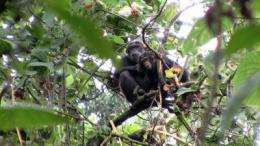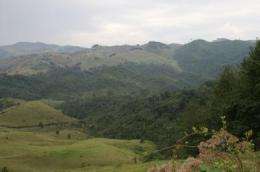Rwanda's Forest of Hope to expand by 21 percent, begin corridor for endangered chimpanzees

Efforts will begin this year to expand the Gishwati National Conservation Park in Rwanda by 21 percent and begin the development of a 30-mile (50 km) forest corridor to Nyungwe National Park for a group of 14 chimpanzees facing extinction. Organizers of the Gishwati Area Conservation Program (GACP) say that in 2010 they will fund reforestation of 647 acres (262 hectares) in the Kinyenkanda area of Rutsiro District in Rwanda's Western Province.
Those efforts will increase the size of the Gishwati National Conservation Park from 3,018 acres (1,222 hectares) to 3,665 acres (1,484 hectares) and stabilize steep hillsides in an area that has been plagued by landslides and severe erosion into the Sebeya River. Approximately 150 families trying to establish small, intensive household farm plots on very steep slopes had occupied Kinyenkanda. Once cleared of trees and native vegetation, the soil eroded continuously into the Sebeya River, seriously degrading water quality.
"The water quality of the Sebeya River is linked to the health of local people and the national economy," said Dr. Benjamin Beck, director of the Gishwati Area Conservation Program. "The Sebeya is not only an important source of drinking water for local residents but it also provides hydroelectric power and water for beverage production downstream."
The Rwandan national government has begun to restore the Sebeya River and the Rutsiro District government completed last November the resettlement of the 150 Kinyenkanda families. The Gishwati Area Conservation program provided both conflict resolution services during the resettlement and funding to acquire land for new homes.
"Now, Kinyenkanda must be reforested. This will stabilize the hillsides and reduce erosion into the Sebeya, helping to restore its clarity and economic usefulness," Beck said. "Since Kinyenkanda has been added to the Gishwati National Conservation Park, reforestation will also provide additional habitat for the 14 chimpanzees and other animals that live in the Park. "

Kinyenkanda is positioned at the beginning of the planned 30-mile (50 kilometer) forest corridor to Nyungwe National Park. Reforestation of the area will represent the initial 4 percent of corridor development. The core of Kinyenkanda will be planted with native trees while a 100 meter buffer zone will be planted with fast-growing non-native trees that can be harvested by local residents for fuel wood and charcoal making. The goal is to establish a local forest protection committee to manage this small buffer forest.
The reforestation will be managed by a contractor, and GACP will negotiate that all laborers be hired locally, preferably from among those families that were resettled. GACP will expand its forest monitoring force from four ecoguards to six, with the two additional ecoguards monitoring Kinyenkanda. It's hoped qualified candidates for these lucrative positions will come from the resettled families as well.
"The reforestation of Kinyenkanda is a perfect example of win-win-win sustainable conservation. There are local and national economic benefits, the chimpanzees and other fauna will enjoy expanded habitat, and the environmental quality of the river and the atmosphere will be enhanced," said Beck.
The Gishwati Area Conservation Program began in late 2007 when H.E. President Paul Kagame and Great Ape Trust and Earthpark Founder Ted Townsend pledged at the Clinton Global Initiative meeting to found a "national conservation park" in Rwanda to benefit climate, biodiversity and the welfare of the Rwandan people. Great Ape Trust is a scientific research center in Des Moines, Iowa and Earthpark is a proposed national center for science-based ecological literacy and immersive learning for students, educators and visitors.
The Gishwati Forest Reserve's history of deforestation extends over 50 years, in part because of ill-advised large-scale cattle ranching projects, resettlement of refugees after the genocide, inefficient small-plot farming and the establishment of plantations of non-native trees. As a result, the area has been plagued with catastrophic flooding, landslides, erosion, decreased soil fertility, decreased water quality and heavy river siltation - all of which aggravate a cycle of abject poverty.
Provided by Great Ape Trust of Iowa















